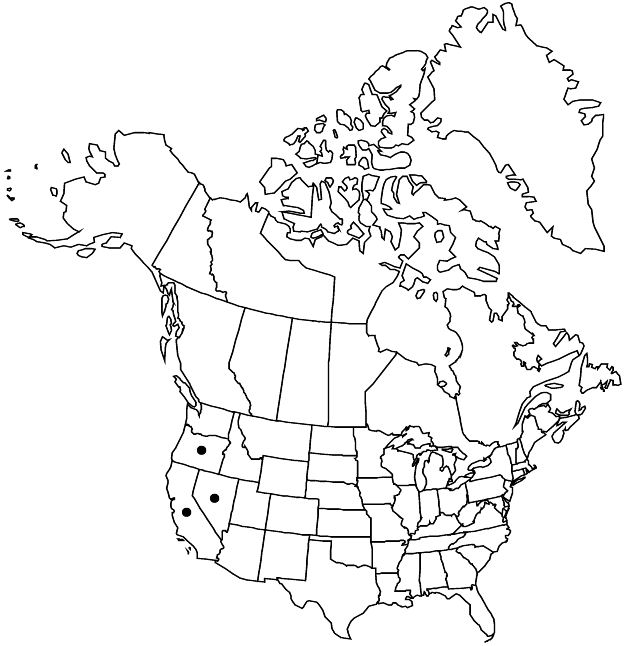Difference between revisions of "Drymocallis lactea var. austiniae"
J. Bot. Res. Inst. Texas 1: 36. 2007.
FNA>Volume Importer |
FNA>Volume Importer |
||
| Line 29: | Line 29: | ||
|phenology=Flowering May–Jul(–Aug) Rocky seasonally moist places, meadows; 900–2800 m; Calif. | |phenology=Flowering May–Jul(–Aug) Rocky seasonally moist places, meadows; 900–2800 m; Calif. | ||
|distribution=;Nev.;Oreg. | |distribution=;Nev.;Oreg. | ||
| − | |discussion=<p>Variety austiniae was erroneously treated as Potentilla glandulosa subsp. ashlandica (Greene) D. D. Keck (B. Ertter 1993); it now is understood to be a separate entity. As here defined, it is the common large-petaled, open-flowered Drymocallis of northern California and adjacent Oregon and Nevada, differing from var. lactea in its more widely branched inflorescences and usually pale to bright yellow petals. The boundary between the two varieties is unclear, in part because petal color is uncertain on herbarium specimens. Some collections from Steens Mountain, Oregon, are transitional to D. pseudorupestris var. saxicola. Occasional populations in northern California that combine the morphology of var. austiniae with more glandular vestiture on pedicels and stems might indicate introgression with D. ashlandica or D. pseudorupestris.</p> | + | |discussion=<p>Variety austiniae was erroneously treated as <i>Potentilla</i> glandulosa subsp. ashlandica (Greene) D. D. Keck (B. Ertter 1993); it now is understood to be a separate entity. As here defined, it is the common large-petaled, open-flowered <i>Drymocallis</i> of northern California and adjacent Oregon and <i>Nevada</i>, differing from <i></i>var.<i> lactea</i> in its more widely branched inflorescences and usually pale to bright yellow petals. The boundary between the two varieties is unclear, in part because petal color is uncertain on herbarium specimens. Some collections from Steens Mountain, Oregon, are transitional to <i>D. pseudorupestris </i>var.<i> saxicola</i>. Occasional populations in northern California that combine the morphology of <i></i>var.<i> austiniae</i> with more glandular vestiture on pedicels and stems might indicate introgression with <i>D. ashlandica</i> or <i>D. pseudorupestris</i>.</p> |
|tables= | |tables= | ||
|references= | |references= | ||
| Line 51: | Line 51: | ||
|publication year=2007 | |publication year=2007 | ||
|special status=Endemic | |special status=Endemic | ||
| − | |source xml=https://jpend@bitbucket.org/aafc-mbb/fna-data-curation.git/src/ | + | |source xml=https://jpend@bitbucket.org/aafc-mbb/fna-data-curation.git/src/8f726806613d60c220dc4493de13607dd3150896/coarse_grained_fna_xml/V9/V9_463.xml |
|subfamily=Rosaceae subfam. Rosoideae | |subfamily=Rosaceae subfam. Rosoideae | ||
|tribe=Rosaceae tribe Potentilleae | |tribe=Rosaceae tribe Potentilleae | ||
Revision as of 19:17, 18 September 2019
Stems (0.4–)1.5–4.5(–6.5) dm; base sparsely to densely short-hairy, sometimes moderately septate-glandular. Inflorescences (2–)5–30(–50)-flowered, (1/6–)1/4–1/2(–4/5) of stem, wide, branch angles (10–)20–40(–50)°. Pedicels 2–20(–30) mm, sparsely to ± densely short-hairy, usually eglandular, sometimes sparsely to moderately septate-glandular. Petals (cream-white) pale to bright yellow.
Phenology: Flowering May–Jul(–Aug) Rocky seasonally moist places, meadows; 900–2800 m; Calif.
Discussion
Variety austiniae was erroneously treated as Potentilla glandulosa subsp. ashlandica (Greene) D. D. Keck (B. Ertter 1993); it now is understood to be a separate entity. As here defined, it is the common large-petaled, open-flowered Drymocallis of northern California and adjacent Oregon and Nevada, differing from var. lactea in its more widely branched inflorescences and usually pale to bright yellow petals. The boundary between the two varieties is unclear, in part because petal color is uncertain on herbarium specimens. Some collections from Steens Mountain, Oregon, are transitional to D. pseudorupestris var. saxicola. Occasional populations in northern California that combine the morphology of var. austiniae with more glandular vestiture on pedicels and stems might indicate introgression with D. ashlandica or D. pseudorupestris.
Selected References
None.
